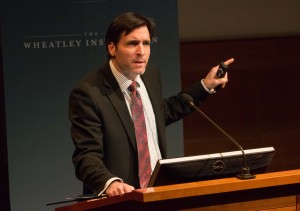
The Wheatley Institution hosted James Patton, executive vice president and COO of The International Center for Religion and Diplomacy (ICRD), to speak on the role of religion in conflict dynamics Tuesday evening.
When the two words “conflict” and “religion” are combined, most do not connect the two words the way James Patton connects them.
“I would imagine very few of you think of the unique ways that religion can actually act to heal historical wounds and to heal identity conflicts and to bring people together,” Patton said.
Patton explained the idea that religious authority trumps all other authorities. Eighty-five percent of people claim to be religious, according to Patton.
He spoke about the group he represents and said the ICRD takes a broader approach on the understanding “of how faith and religious institutions function in human society and particularly in conflict dynamics.”
Their aim is to understand what attributes of a religion will help prevail against all odds of societal conflict. The ICRD helps find commonalities between religions or religious leaders that help people connect on a human level.
The work of the ICRD is important because if someone of a high religious authority changes his or her perspective, it sets an example for those who admire the person.
“The impact that someone … can have if they start to interpret the same ideology in a nonviolent fashion is dramatic,” Patton said.
Patton has no intention of manipulating or damaging someone’s knowledge of a religion. His hopes are to find a way to get two groups to “work on the work in the world that they feel called to do, despite their doctrine differences,” Patton said.
He does this by finding the elements that move people to act in a certain way and by finding a commonality between two religious leaders that will hopefully lead to a peaceful connection.
“Peace requires people, and you don’t make peace with your friends,” Patton said.
Patton closed the forum with the biblical story of Peter walking on water. He said when Peter expressed his faith by doing something so irrational as to thinking he could walk on water, he set an example to those who witnessed the miracle.
Patton related this story by recognizing the example set by a religious leader stepping out of his own paradigm.
“In that moment of actually breaking out of his own paradigm of what was safe and secure and what was dangerous, he had a ripple effect that he could not possibly imagine having had and just shattered the paradigms of other folks,” Patton said.




